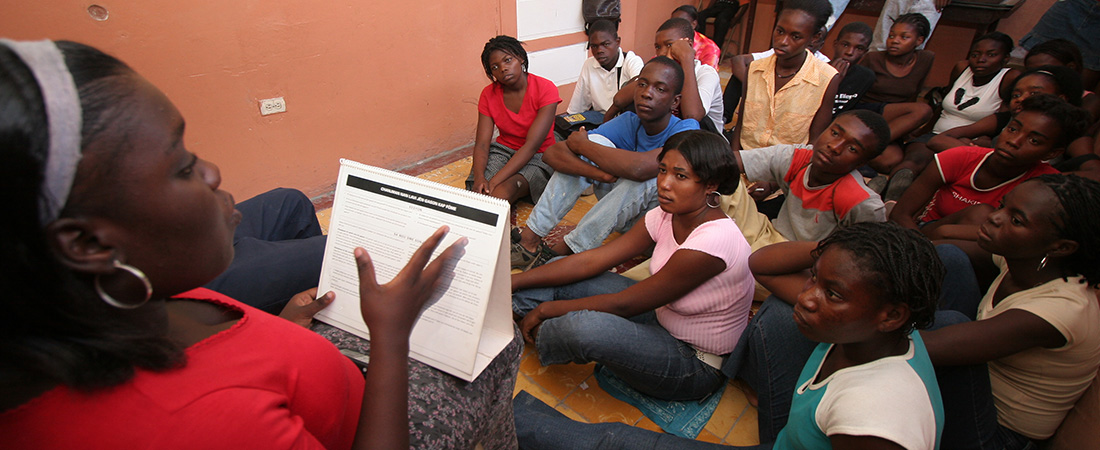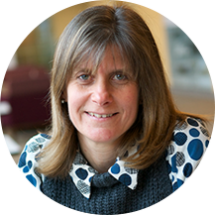Strengthening Learning in Fragile States

Before joining EDC, Cornelia Janke worked for the Redlands Christian Migrant Association in Florida managing child-care and education services for migrant families.
“There’s a whole subculture of people harvesting the fields year-round,” Janke says of the migrant workers who come here to eke out a living in the orange groves, apple orchards, and vegetable fields. “Watching these families struggle gave me a deep sense of humility. I learned to listen and to respect their perspectives.”
A New Jersey native, Janke also taught secondary school in Germany as a Fulbright Scholar. Her desire to make education possible for vulnerable populations led her to EDC in the mid-1990s. “I found that I enjoyed designing and managing programs and initiatives that gave access to education to people who wouldn’t otherwise have it,” she says.
Janke has worked in most regions of the world, notably in Haiti, Honduras, Ghana, South Africa, Tanzania, Rwanda, Afghanistan, East Timor, Bosnia, and Kosovo.
“It’s gratifying to know that our work really does facilitate access to life-changing opportunities,” she says.
What are the challenges for learning and work programs in regions plagued by conflict?
 In places where people have suffered from years of conflict or instability, there is not an effective government, there is no reliable infrastructure, and there may be active violence. These conditions directly impact health care, educational access and quality, and people’s ability to earn a livelihood.
In places where people have suffered from years of conflict or instability, there is not an effective government, there is no reliable infrastructure, and there may be active violence. These conditions directly impact health care, educational access and quality, and people’s ability to earn a livelihood.
In conflict situations, whole generations of learners may be denied access to formal basic education. When the conflict is over, they have missed that critical basic education window. They are too old to enroll in primary school, and weak governments offer few alternatives for older learners. As a result, many people are not as productive as they can be, making it difficult to re-start economic development.
How can learning be strengthened in these regions?
EDC works with ministries of education, local educators, and community institutions. We help them develop curricula, teacher training programs, other support programming, and access opportunities for marginalized populations. When possible, we include and strengthen relevant community-based and private sector organizations to create an infrastructure that will hold up as the country gets back on its feet. When a project ends, we want to have confidence that the educational progress will continue.
Two particular education strategies we’ve found to be effective are interactive radio instruction [IRI] and youth work-skills training programs. IRI brings learning to classrooms in remote places using radios or MP3 players. Youth work-skills training programs give young people opportunities to build better futures for themselves.
What effect can learning have on promoting peace in these environments?
In many fragile places, the government has broken down, as has the trust between the people and their government. So rebuilding the government capacity to provide education for its people is very important. When education works well, when access and quality are equitably provided, it’s a very visible and significant social benefit to the people. Data show that countries with a higher secondary education level often also show lower incidence of conflict.
You’ve worked in Haiti. What is the situation there now?
Haiti was a fragile place even before the earthquake, and it’s going to be fragile for a long time to come. Beginning in 2003, EDC focused on youth ages 15–24 who had very little formal education. We offered nonformal basic education, combined with technical skills training and either work experience, entrepreneurship, or support for further schooling. When the project closed in July 2011, we had reached more than 13,000 youths across the country and raised local and international awareness about Haiti’s critical workforce development needs, and in particular, youths’ potential as change agents.
Since the earthquake, I think there’s been a broader recognition on the part of the international community that Haiti needs long-term international support to rebuild. Little by little, they are making progress. That is good news.
What does it take for education to create lasting change in fragile environments?
In unstable environments, there isn’t a lot of looking to the future. People are living day to day. In these settings, people need opportunities to invest in something that will have both immediate and longer-term payoffs. Good education offers that. Like anywhere else, good education means relevant education. But in fragile environments, relevant education means that learners, their families, and their communities can quickly use what they learn build better lives and a stronger nation.